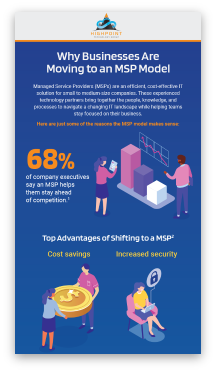Search this site

Reimagine Your IT With the Cloud
Every type, size, and sector of business is leveraging the cloud for a wide range of use cases, including data backup, disaster recovery, virtual desktops, and customer-facing web apps. Yet gaining the full benefits of the cloud is frequently hampered by a lack of standards, inadequate IT resources, incorrect cloud configurations, and cost management challenges.
HighPoint Technology Group gives your business the operational support needed to maximize your cloud services and infrastructure.
Benefits of Our Cloud Services
High-Touch Engagements
Regular one-on-one communication ensures that you receive the kind of customer support you deserve, whether through in-person meetings, video chats, or phone calls.
Handpicked Talent
To make sure everything runs smoothly, a customer experience manager (CEM) and engineer are assigned to you based on your technical requirements, industry, users, and company personality.
Smooth Transition
Don’t worry about downtime or disrupting employee workflows. Onboarding tasks, like installing and updating computers, are completed at times that are convenient for your team.
Our Cloud Services

Private Cloud
Choose from self-managed resource pools, private cloud, and fully managed cloud services to experience new levels of performance for your cloud interface.
Self-managed resource pools
In accordance with your specifications, we provide access to a pool of VMware resources, giving you and your engineers full control over the entire stack – from the hypervisor to the virtual network layer to your business apps.
Self-managed private cloud
With a self-managed cloud, you can control the stack from the operating system up, or add managed services for additional support right when you need it.
Managed private cloud
Our Volaré managed private cloud delivers the ultimate peace of mind by allowing you to focus on application development instead of server management.
Managed Public Cloud
Experience a value-added approach for managing and optimizing your public cloud infrastructure with comprehensive cloud management and governance solutions, such as:
Security and identity
Gain insight to hundreds of critical pre-built security best practice checks and alerts, ensuring full access and visibility to the state of your public cloud.
Cost transparency and optimization
Take advantage of proactive cost management capabilities, which include reserved instance recommendations for EC2, RDS, and ElastiCache, as well as reserved nodes, automatic custom budget alerts, streamlined billing reports, and granular details of your public cloud spend.
Continuous total compliance
Get compliance monitoring with scoring for 35 regulatory standards, including HIPAA, SEC, PCI DSS, CIS, FISMA, NIST, SOC2, and other major compliance requirements.
Strategy and review sessions
Meet with your delegated cloud adviser on a regular cadence to examine all aspects of your public cloud wellness reports. This can include the progression of your program, price management guidelines, and best practices based on updates from the cloud sector that may affect your organization.
Capacity and resource optimization
Secure access to the best asset tracking and inventory management as well as the right sizing and rebalancing opportunities.
Design/deploy
Our public cloud engineering teams compile and update hundreds of design and deployment best practices for public cloud configurations that impact security, cost, and availability.

Hybrid Cloud Services
Meet your technical and business objectives more effectively, more securely, and with greater cost efficiency compared to a public or private cloud alone. Our Volaré hybrid cloud solutions offer significant benefits in several areas, including:
Security and compliance
Deploy highly regulated or otherwise sensitive workloads in a fully dedicated private cloud environment while still deploying less-sensitive workloads to public cloud services.
Scalability and resilience
Scale up quickly, inexpensively, and even automatically using public cloud infrastructure and then scale back down when the surge subsides – all without impacting other workloads running on your private cloud.
Resource optimization and cost savings
Gain more options and flexibility for deploying workloads in a way that makes the best use of your on-premises investments and your overall infrastructure budget.

Microsoft 365 and Office 365 for the Cloud
Harness the power of Microsoft cloud solutions to drive a competitive advantage for your business with discounts, training opportunities, and advanced support. Working with us as your Microsoft cloud solution provider offers many benefits:
- One point of contact for all your cloud needs
- Guaranteed better pricing
- Flexible payment options (monthly, quarterly, or annually)
- 24/7 support (easier engagement for both Levels 1 and 2)
- Access to a wider ecosystem of HighPoint’s solutions and services
- Migration (our team will provide licenses as well as professional services for a smooth migration)

Virtual Desktops
Use a virtual desktop infrastructure to access vital capabilities without having to build programs entirely in-house. Outsourcing virtual desktop infrastructures to a Managed Service Provider (MSP) leads to:
- Superior user experience
- Enhanced security
- Simplified management
- Significant cost savings
- Fully managed environment

Cloud Storage Solutions
Take advantage of a reliable, flexible, and secure hosted storage solution that meets your changing business needs. Our Volaré cloud Storage as a Service (STaaS):
- Provides predictable costs with the flexibility to scale
- Reduces capital expenditure requirements for data storage
- Is built on a reliable infrastructure platform
- Offers flexibility to scale capacity when you need it
- Provides secure hosting in our Tier 3 and 4 enterprise-class data centers
- Reduces operational expenditure costs for storage array administration
- Enables business continuity solutions, including replication and disaster recovery







Frequently Asked Questions
Lorem ipsum dolor sit amet, consectetur adipiscing elit, sed do eiusmod?
Diagnostics techniques & programmation
Diagnostics techniques & programmation
Diagnostics techniques & programmation
Get a Free Technology Assessment

Have a question?
We're here to help.


